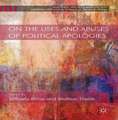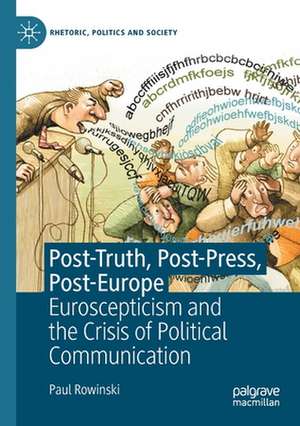Post-Truth, Post-Press, Post-Europe: Euroscepticism and the Crisis of Political Communication: Rhetoric, Politics and Society
Autor Paul Rowinskien Limba Engleză Paperback – 21 sep 2021
| Toate formatele și edițiile | Preț | Express |
|---|---|---|
| Paperback (1) | 778.76 lei 6-8 săpt. | |
| Springer International Publishing – 21 sep 2021 | 778.76 lei 6-8 săpt. | |
| Hardback (1) | 782.87 lei 6-8 săpt. | |
| Springer International Publishing – 21 sep 2020 | 782.87 lei 6-8 săpt. |
Din seria Rhetoric, Politics and Society
-
 Preț: 178.02 lei
Preț: 178.02 lei -
 Preț: 346.34 lei
Preț: 346.34 lei - 20%
 Preț: 690.25 lei
Preț: 690.25 lei - 15%
 Preț: 699.45 lei
Preț: 699.45 lei - 15%
 Preț: 638.89 lei
Preț: 638.89 lei - 15%
 Preț: 696.50 lei
Preț: 696.50 lei -
 Preț: 390.63 lei
Preț: 390.63 lei -
 Preț: 389.88 lei
Preț: 389.88 lei -
 Preț: 385.62 lei
Preț: 385.62 lei -
 Preț: 386.61 lei
Preț: 386.61 lei - 15%
 Preț: 638.43 lei
Preț: 638.43 lei - 18%
 Preț: 781.62 lei
Preț: 781.62 lei - 15%
 Preț: 645.14 lei
Preț: 645.14 lei - 15%
 Preț: 640.71 lei
Preț: 640.71 lei - 18%
 Preț: 891.02 lei
Preț: 891.02 lei - 15%
 Preț: 584.76 lei
Preț: 584.76 lei - 9%
 Preț: 635.93 lei
Preț: 635.93 lei - 18%
 Preț: 1004.36 lei
Preț: 1004.36 lei - 15%
 Preț: 696.82 lei
Preț: 696.82 lei - 18%
 Preț: 1004.00 lei
Preț: 1004.00 lei - 15%
 Preț: 641.20 lei
Preț: 641.20 lei - 15%
 Preț: 697.65 lei
Preț: 697.65 lei -
 Preț: 479.29 lei
Preț: 479.29 lei -
 Preț: 483.70 lei
Preț: 483.70 lei - 18%
 Preț: 886.43 lei
Preț: 886.43 lei - 18%
 Preț: 781.62 lei
Preț: 781.62 lei - 9%
 Preț: 676.90 lei
Preț: 676.90 lei -
 Preț: 352.80 lei
Preț: 352.80 lei - 18%
 Preț: 897.14 lei
Preț: 897.14 lei
Preț: 778.76 lei
Preț vechi: 949.71 lei
-18% Nou
Puncte Express: 1168
Preț estimativ în valută:
149.01€ • 155.58$ • 123.33£
149.01€ • 155.58$ • 123.33£
Carte tipărită la comandă
Livrare economică 04-18 aprilie
Preluare comenzi: 021 569.72.76
Specificații
ISBN-13: 9783030555733
ISBN-10: 3030555739
Pagini: 252
Ilustrații: IX, 252 p. 1 illus.
Dimensiuni: 148 x 210 mm
Greutate: 0.35 kg
Ediția:1st ed. 2021
Editura: Springer International Publishing
Colecția Palgrave Macmillan
Seria Rhetoric, Politics and Society
Locul publicării:Cham, Switzerland
ISBN-10: 3030555739
Pagini: 252
Ilustrații: IX, 252 p. 1 illus.
Dimensiuni: 148 x 210 mm
Greutate: 0.35 kg
Ediția:1st ed. 2021
Editura: Springer International Publishing
Colecția Palgrave Macmillan
Seria Rhetoric, Politics and Society
Locul publicării:Cham, Switzerland
Cuprins
1. Introduction.- 2. A Voyage Through Emotive Rhetoric: and the Challenge to Truth.- 3. Methodology.- 4. Italy First.- 5. Italy First: A Journey in to Emotive Rhetoric.- 6. Britain First.- 7. Britain First: A Journey in to Emotive Rhetoric.- 8. Conclusions.
Notă biografică
Paul Rowinski is Senior Lecturer in Journalism at the University of Bedfordshire, UK. He worked for the regional, national and transnational press for two decades, including as a UK central European correspondent, writing for the Financial Times, The Independent, The Scotsman, Scotland on Sunday and The European. His research focuses on the discourse and political communication of Europe in the media.
Textul de pe ultima copertă
‘Paul Rowinski's typically robust polemic pulls few punches and is not for the faint-hearted or the closed-minded. Ardent fans of tabloid xenophobia masked as Euroscepticism are unlikely to enjoy this rollercoaster ride, an uncompromising critique of the political and journalistic rhetoric of contemporary European nationalism. This book fights fire with fire. It isn't so much a cure for the rabid pack of the populist press and their demagogic masters. Rowinski has brought a shotgun to the party, and his cartridges are well primed.’–Professor Alec Charles, Dean of the Faculty of Arts, University of Winchester, UK
This book explores whether a beleaguered press in recent years has been developing an emotive, Eurosceptic post-truth rhetoric of its own – competing for attention with populist politicians. These politicians now by-pass the media, talking directly to their publics in blogs, on Twitter and Facebook. In the post-truth age, objective facts are less influential in shaping opinion than appeals to emotion. Audiences congregate around views they share and want to believe. The author presents a critical discourse analysis of the language used by populist politicians online, on Facebook, and subsequently quoted in the press, which highlights how the political rhetoric of Italian and British politicians is often at its most inflammatory around the issue of immigration. The same goes for the press. The Italian case study focuses on media coverage of the 2014 and 2019 European elections and 2018 general election. The British case study examines press reporting of the 2016 UK referendum on EU membership, the 2017 general election, and the September 2019 parliamentary debate immediately following the UK Supreme Court ruling that proroguing of Parliament was illegal. From the picture that emerges, the author argues that journalists need to change how they report, to challenge the post-truthers, holding them to account and pressing them on thefacts while also harnessing the emotions of disaffected publics.Paul Rowinski is Senior Lecturer in Journalism at the University of Bedfordshire, UK. He worked for the regional, national and transnational press for two decades, including as a UK central European correspondent, writing for the Financial Times, The Independent, The Scotsman, Scotland on Sunday and The European. His research focuses on the discourse and political communication of Europe in the media.
This book explores whether a beleaguered press in recent years has been developing an emotive, Eurosceptic post-truth rhetoric of its own – competing for attention with populist politicians. These politicians now by-pass the media, talking directly to their publics in blogs, on Twitter and Facebook. In the post-truth age, objective facts are less influential in shaping opinion than appeals to emotion. Audiences congregate around views they share and want to believe. The author presents a critical discourse analysis of the language used by populist politicians online, on Facebook, and subsequently quoted in the press, which highlights how the political rhetoric of Italian and British politicians is often at its most inflammatory around the issue of immigration. The same goes for the press. The Italian case study focuses on media coverage of the 2014 and 2019 European elections and 2018 general election. The British case study examines press reporting of the 2016 UK referendum on EU membership, the 2017 general election, and the September 2019 parliamentary debate immediately following the UK Supreme Court ruling that proroguing of Parliament was illegal. From the picture that emerges, the author argues that journalists need to change how they report, to challenge the post-truthers, holding them to account and pressing them on thefacts while also harnessing the emotions of disaffected publics.Paul Rowinski is Senior Lecturer in Journalism at the University of Bedfordshire, UK. He worked for the regional, national and transnational press for two decades, including as a UK central European correspondent, writing for the Financial Times, The Independent, The Scotsman, Scotland on Sunday and The European. His research focuses on the discourse and political communication of Europe in the media.
Caracteristici
Explores how mainstream press, in the social media age, is failing to confront the emotiveness of Post-Truth while actually feeding it Analyses the synergies that can combine in Post-truth Eurosceptic press discourse Unravels the power struggles below the surface of subsequent political and media discourse analysed
